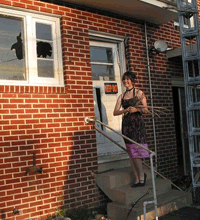Recommended playlist for driving around New Orleans: Songs off the CDs my friends sent each other while we were spread around the country for several months after Katrina. Zeppelin’s “When the Levee Breaks,” of course. Concrete Blonde’s “Bloodletting,” where “I’ve got the ways and means” rhymes with “New Orleans.” (It’s okay because it’s a song, though employing that long “e” under any other circumstances would be supremely uncool.) The New Pornographers’ “The Slow Descent Into Alcoholism” for obvious reasons; an Erasure cover of Abba’s “S.O.S.” because we thought a reference to a sinking ship was kind of funny.
My destination: The University of New Orleans. I’m working on a story about the state of higher education post-Katrina, which may or may not end up being a story about how Bobby Jindal’s a douchebag.
My first interview was with a former provost and current faculty member. He does not like it when legislators blame UNO’s drastic budget cuts on diminished state revenues without mentioning that the tax code was recently revised specifically to diminish revenues. Back in 2002, an amendment called the Stelly Plan eliminated some sales taxes but implemented a new income tax. Two years ago, Jindal eliminated the new income tax without implementing anything to make up for the revenue loss.
So UNO is on a budget freeze. An assistant told me that no one is authorized to buy pens; she confessed to having stolen and hoarded some from another office. I talked to a faculty member on his way to a meeting where they were going to make a list of staff to be fired when the next round of budget cuts come through. “It’s like something out of a terrible movie,” he said, “where some of the prisoners have to die and the officers are all gathering around to decide…Have you ever seen Stanley Kubrick’s Paths of Glory?”
I got a way rosier picture over at the vice chancellor for campus services’ office. Though the campus still has some significant Katrina damage, five years later, the university has already spent $60 or $70 million and has $30 million or so to go before reconstruction is complete. Whether or not there is any faculty around to teach the students, supposedly it’ll be done by the end of next year.
UNO is in better physical shape than some other institutions are, certainly better than some entire neighborhoods, like the one I’m staying in. It is, as it tends to be, too hot to wear pants if you don’t have to, and the other day I took a phone call leaning against the cool glass of the living room windows. I later apologized to the friend who’s giving me run of his unused property for showing the neighbors my underwear. “Those houses across the street are still empty,” he said. “There’s nobody there.”















